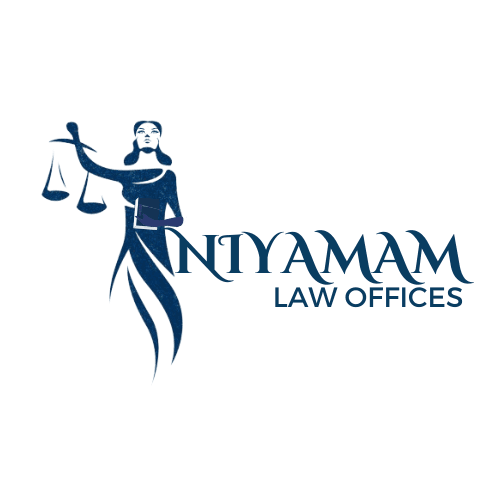Money Recovery Lawyer in Delhi – Trusted Legal Experts for Fast and Effective Recovery
When someone refuses to return your money—whether it’s a loan to a friend, unpaid business dues, or bounced cheques—it can feel frustrating and hopeless. The good news is that Indian law provides strong remedies for money recovery, and with the guidance of the best money recovery lawyer in Delhi, you can enforce your rights and recover your hard-earned money legally and efficiently.
At Niyamam Law Offices, we provide end-to-end legal support for businesses dealing with unpaid invoices, a financial institution seeking recovery of loans, or an individual facing challenges in recovering money lent, our experienced team of money recovery lawyer in Delhi specializes in handling matters under civil and criminal laws, including recovery suits, cheque bounce cases, and arbitration proceedings.

Trustindex verifies that the original source of the review is Google. Adv ankit helped me for my ongoing divorce case. He knows how to handle these kind emotional turmoil of their clients. He is one of the best divorce lawyer in Delhi so far. I highly recommend him for divorce cases.Posted onTrustindex verifies that the original source of the review is Google. The divorce lawyer in Delhi at Niyamam Law Offices made a very tough time easier for me. Advocate Ankit Kumar was empathetic and patient, and the firm handled everything smoothly. I am very grateful for their support during my case.Posted onTrustindex verifies that the original source of the review is Google. I had a cheque bounce case and was very stressed, but Advocate Ankit Kumar and his team at Niyamam Law Offices handled it with great expertise. He is truly the best cheque bounce lawyer in Delhi. The firm is professional, approachable, and always ready to explain things in simple terms. My issue was resolved much faster than I expected.Posted onTrustindex verifies that the original source of the review is Google. Thanks to Ankit Kumar sir. We won the case in very short time period by his excellent knowledge and experience. Advocate Ankit Kumar is the best divorce lawyer in delhiPosted onTrustindex verifies that the original source of the review is Google. One of my friend recommended Advocate Ankit to hire him as my divorce lawyer and I am truly grateful for that decision. Divorce is never easy, but Advocate Ankit made the entire process far less stressful. He patiently understood my situation, explained my legal options clearly, and guided me through every step of the proceedings. What sets him apart is his blend of professionalism and empathy. He was always approachable, answered my queries without delay, and gave me complete confidence in his strategy. My case involved complex issues of property division and alimony, yet he handled it with precision and secured a fair outcome for me. I would strongly recommend Advocate Ankit to anyone in need of a reliable, compassionate, and highly skilled divorce lawyer in Delhi. His expertise and commitment make him one of the finest family lawyers I have ever met.Posted onTrustindex verifies that the original source of the review is Google. I consulted Advocate Ankit from Niyamam Law Offices during a very difficult phase of my life, and I can confidently say he is one of the best divorce lawyers in Delhi. From the very first meeting, he patiently listened to my concerns, explained the legal process in detail, and gave me the confidence to move forward. My case involved not only divorce but also child custody and maintenance, and he handled everything with professionalism and compassion. What impressed me most was his transparent approach—he kept me informed at every stage, never gave false promises, and ensured that my interests were always protected. His expertise in family and matrimonial law, combined with his courtroom skills, helped me achieve a fair and timely resolution. If anyone is looking for a trusted divorce lawyer in Delhi, I would strongly recommend him. Thank you Advocate Ankit for my case.Posted onTrustindex verifies that the original source of the review is Google. Niyamam law handled my legal issue with professionalism and care. Highly Recommend!Posted onTrustindex verifies that the original source of the review is Google. "If you are looking for a property lawyer in Delhi,Niyamam Law offices is the best choice. Advocate Ankit Kumar handled my property dispute with the legal process clearly and ensured my rights were fully protected.I felt very secure with his advicePosted onTrustindex verifies that the original source of the review is Google. I searched online for the top lawyer in Delhi and found Advocate Ankit Kumar of Niyamam Law Offices. From the first meeting itself, I felt confident about my case. He has deep knowledge of law and represents clients with full commitment. The entire firm works very professionally
Why Hire a Money Recovery Lawyer in Delhi?
Recovering money from someone unwilling to pay is rarely simple. Even with evidence like written contracts, cheques, or online transfers, defaulters often use delay tactics, hide assets, or deny liability. Without legal expertise, you risk wasting both time and money. This is where a specialized recovery lawyer in Delhi becomes your strongest ally.
Benefits of Hiring a Debt Recovery Advocates:
Legal Expertise: Navigating Indian laws like the Civil Procedure Code (CPC), Negotiable Instruments Act, and the Indian Penal Code (IPC) requires professional knowledge.
Time-Sensitive Action: Claims must be filed within the limitation period of 3 years from the cause of action. Lawyers ensure deadlines are met.
Effective Legal Notices: A strongly worded legal notice for money recovery often compels repayment before litigation.
Court Representation: Advocates handle pleadings, evidence, cross-examination, and arguments on your behalf.
Negotiation Skills: A lawyer can negotiate out-of-court settlements to save time and costs.
At Niyamam Law Offices, our recovery lawyers practice regularly in Tis Hazari Court, Saket Court, Karkardooma Court, Patiala House Court, Rohini Court, Dwarka Court, and the Delhi High Court, giving us a practical edge in handling your case.
Legal Options for Money Recovery in India
Indian law offers multiple remedies for debt recovery. The right option depends on whether you have a written contract, cheque, invoice, or even oral agreement backed by proof.
1. Legal Notice for Recovery of Money
A legal notice is the first formal step.
It demands payment within a fixed time (usually 15–30 days).
Many disputes settle here, avoiding litigation.
Our firm drafts powerful legal notices that compel action.
2. Civil Suit for Recovery of Money
If the debtor ignores the notice, you can file a civil suit under Order IV CPC.
Jurisdiction depends on the claim amount:
Lower courts for smaller claims.
Delhi High Court for higher-value disputes.
Once decreed, the court can order attachment of property, salary, or bank accounts.
3. Summary Suit under Order XXXVII CPC
A summary suit is a fast-track procedure for money recovery based on written contracts, promissory notes, or dishonored cheques.
The defendant’s ability to contest is restricted. If they fail to provide a valid defense, judgment can be passed quickly.
4. Cheque Bounce Case under Section 138 NI Act
If a cheque is dishonored due to insufficient funds or account closure, you can file a criminal complaint under Section 138 of the Negotiable Instruments Act.
Process:
Send legal notice within 30 days of cheque dishonor.
If not paid within 15 days, file a complaint in court within 30 more days.
Punishment: Up to 2 years imprisonment or fine up to twice the cheque amount.
This is a highly effective remedy as it creates criminal liability.
5. Criminal Complaint under IPC (Sections 406, 420, etc.)
In cases involving fraud or cheating, you can also file a criminal case:
Section 406 IPC – Criminal breach of trust.
Section 420 IPC – Cheating and dishonest inducement.
Criminal proceedings exert strong pressure on the debtor.
6. Insolvency & Bankruptcy Code (IBC) Proceedings
For large debts, especially corporate defaults, creditors can initiate action under the Insolvency & Bankruptcy Code, 2016.
Corporate debtors: File before NCLT.
Individual debtors: File before DRT.
The debtor risks losing control over assets if insolvency is admitted.
7. Arbitration Proceedings
If your agreement has an arbitration clause, disputes can be resolved privately through arbitration.
Arbitration is faster, confidential, and awards are enforceable in court.
8. Debt Recovery Tribunal (DRT)
Applicable to banks and financial institutions for debts over ₹20 lakhs.
A quick remedy under the Recovery of Debts Due to Banks and Financial Institutions Act.
Procedure for Filing a Money Recovery Case in Delhi
The recovery process involves multiple steps:
Case Assessment – Review documents, agreements, and proof.
Sending Legal Notice – Demand repayment with a warning of legal action.
Filing a Case – Depending on your case type (civil suit, NI Act, arbitration, IBC).
Court Proceedings – Evidence, hearings, and cross-examination.
Judgment – Court issues decree/order for repayment.
Execution of Decree – Seizure of assets, bank accounts, or salary if debtor defaults.
Our recovey lawyer in delhi handle every step meticulously to avoid delays.
How Long Do Money Recovery Cases Take?
- Legal Notice – 15–30 days.
- Summary Suit – 6–12 months.
- Ordinary Civil Suit – 2–5 years.
- Cheque Bounce Case – 1–2 years.
- Arbitration – 6–12 months.
- IBC Proceedings – 180–270 days.
Documents Required for Filing Recovery Cases
Written contracts, agreements, or promissory notes.
Cheques, bank transfer slips, or payment receipts.
Invoices, bills, or business transaction records.
Emails, WhatsApp chats, or other communications.
Copies of any earlier notices sent.
Common Challenges in Money Recovery – And Our Solutions
| Challenge | Our Solution |
|---|---|
| Debtor avoids summons | File for ex-parte decree |
| Debtor hides assets | Request attachment of property |
| Delay tactics in court | Use summary procedures |
| No written agreement | Use bank statements, witnesses & digital evidence |
Why Choose Us?
Specialized in Debt Recovery Cases
Expertise in civil suits, cheque bounce cases, and insolvency matters
High Success Rate
Proven track record of recovering millions for clients
Fast Legal Action
Immediate notice drafting and court filings
Transparent Fees
No hidden costs, clear process explained upfront.
Frequently Asked Questions
You must file within 3 years from the date of default.
It depends on the nature of the case. Summary suits and cheque bounce matters are faster, while contested recovery cases may take longer. Our lawyers will guide you on timelines during the consultation.
Yes, through legal notices, mediation, or settlement talks before litigation.
Yes. You can file a civil suit and a criminal complaint for fraud simultaneously.
We can track through legal means and initiate attachment proceedings against their assets.
We explore alternative recovery methods like salary garnishment or future asset claims.
It depends on the amount claimed. Smaller claims go to district courts; larger claims may be filed in the Delhi High Court
